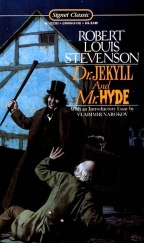The Mysterious Case of Dr Jekyll and Mr Hyde
Robert Louis Stevenson
New American Library
Mass Market Paperback
ISBN 0-451-52393-8
Publication Date: 1886
124 Pages; $3.95
Date Reviewed: 21-06-03
Reviewed by: Katie Dean © 2003

REFERENCES
COLUMNS
|
|
|
The Mysterious Case of Dr Jekyll and Mr HydeRobert Louis StevensonNew American LibraryMass Market PaperbackISBN 0-451-52393-8Publication Date: 1886124 Pages; $3.95Date Reviewed: 21-06-03Reviewed by: Katie Dean © 2003 |
|
|
REFERENCES |
COLUMNS |
First published in 1886, 'The Mysterious Case of Dr Jekyll and Mr Hyde' (Robert Louis Stevenson), is one of those books of which most people are aware, but few have actually read. Some are perhaps put off by the fact that this is a great work of 'classic literature'; others may feel they already know the outline of the story. However, it is a comparatively short work, beautifully written and contains a fascinating and compelling plot.
'The Mysterious Case of Dr Jekyll and Mr Hyde' has become such a well-known story that the phenomenon that it describes is commonly applied today as a phrase to refer to people who display unpredictable mood swings. This cannot do justice to the ideas Stevenson explores in his novel. In part it is about the duality of human nature, the capacity for all people to embody good and bad. However, some commentators have suggested that this may not recognise Stevenson's original inspiration, the medical condition we know as schizophrenia, a condition which undoubtedly existed at that time, but which the medical world did not understand. Beyond these obvious themes, this novel also explores the question of how far man should use scientific experiments to improve upon or adapt nature, a question that also inspired Mary Shelley to write 'Frankenstein'. All these themes are as relevant today as they were in the 1880s and this partly accounts for the enduring popularity of Stevenson's novel. Like Shelley, we may regard Stevenson as being ahead of his time.
It is not just a powerful and timeless theme that has made Jekyll and Hyde a literary 'classic', but also the brilliant descriptive powers of Stevenson. He manages to convey an entire character in a couple of highly imaginative sentences and uses original similes to create a backdrop which stays with the reader for a long time afterwards. All the characters are cleverly thought out and used in the service of allowing this story to unfold. Aside from Jekyll / Hyde, the two main protagonists are Mr Utterson the lawyer and Dr Lanyon, both old friends of Dr Jekyll and both memorable characters in their own right. As vehicles for the plot, Dr Lanyon allows Stevenson to explore the more scientific elements of the novel, while Mr Utterson provides a suitably dry account of events from which any air of sensation is omitted. Despite this matter-of-fact account, the horrific nature of Mr Hyde and the full distress of Dr Jekyll's situation are convincingly brought to life. This clever crafting is essential to the story as, like many of Stevenson's other novels, it was originally contrived as a mystery story. Stevenson recounts a series of events that at first seem disconnected, but actually fall into place very cleverly in the final chapter in order to reveal the 'mystery' to which the full title of the novel alludes. Unfortunately, the impact of this revelation is perhaps slightly lost on the modern reader simply because the main character Jekyll / Hyde is so familiar to us today. However, this does not prevent the reader from feeling the pathos in Dr Jekyll's situation or indeed from speculating upon the real cause of his dual persona.
Classic literature is often ignored today, largely because of a preconceived notion that the description 'classic' equates to inaccessible or boring. Robert Louis Stevenson's novel however, is definitely not inaccessible and far from boring. It raises questions that are relevant today and will certainly leave any reader with a lot to think about. Moreover, it is written in beautiful language and paints characters and scenes that are truly enduring. This is definitely an excellent way into 'classic' literature and in any case well worth reading.